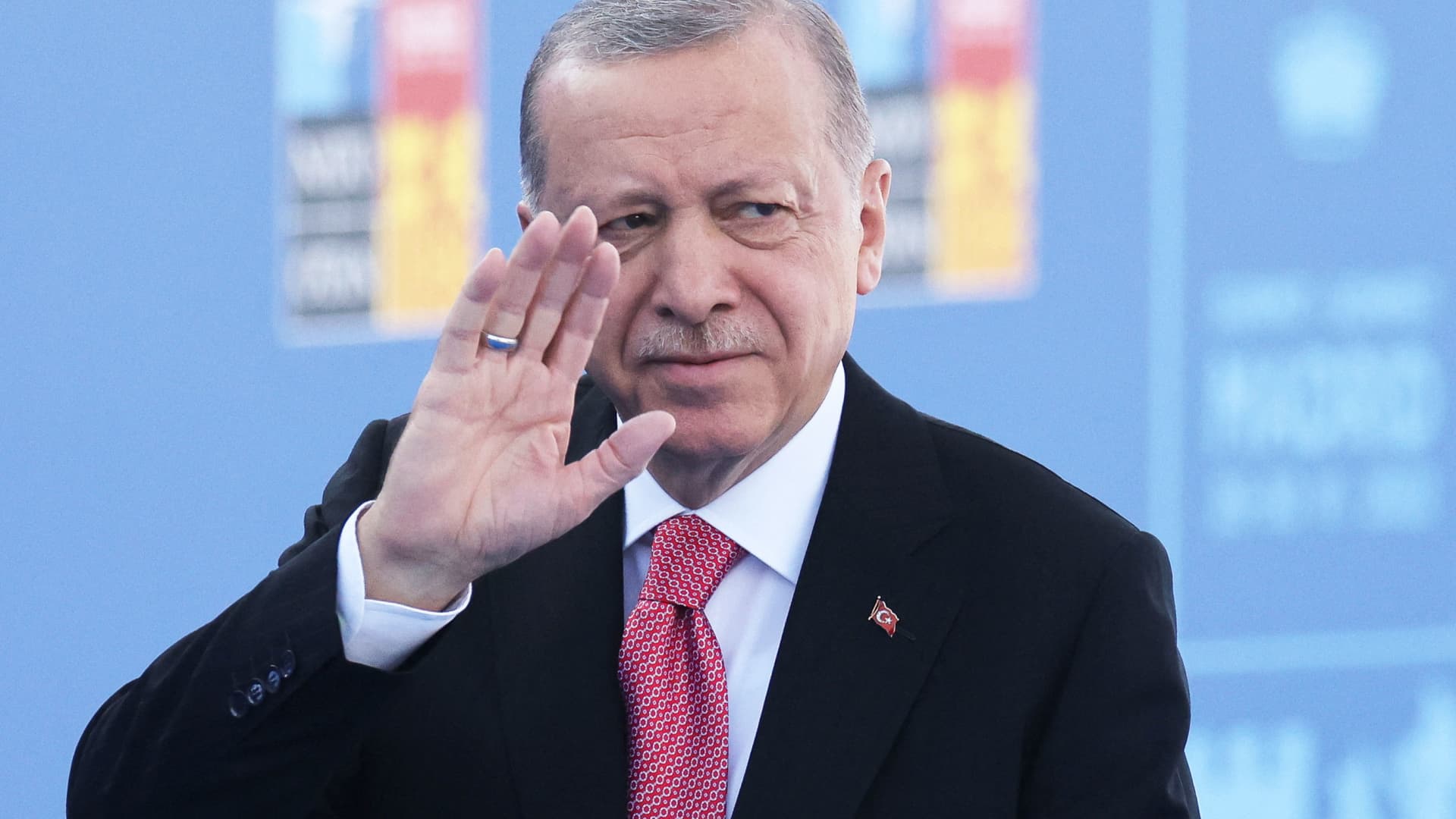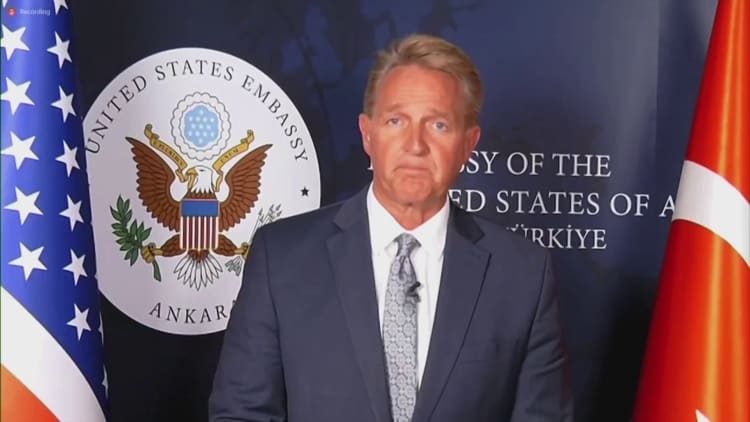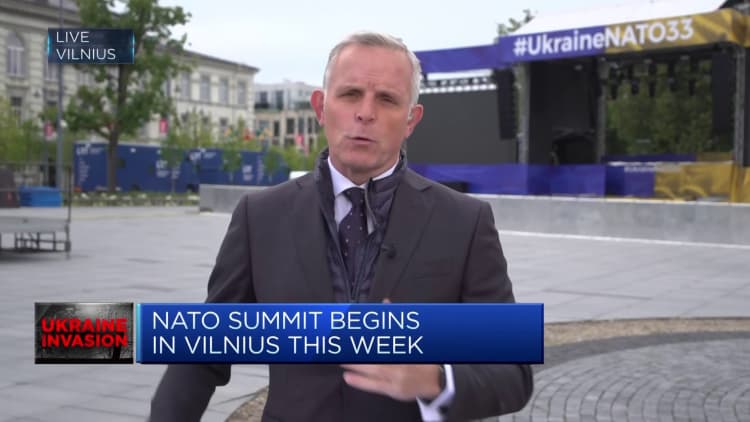Sweden is in the final stretch to NATO membership. But Turkey could yet derail it


Turkish President Tayyip Erdogan arrives for a NATO summit in Madrid, Spain June 29, 2022.
Nacho Doce | Reuters
NATO is convening a summit in Vilnius, Lithuania, on July 11 to approve new defense plans, and — its leaders hope — announce the full approval of a new member to the alliance, Sweden.
But more than a year after the Nordic country made its application to join the defense organization, Turkey — which has been a member since 1952 and boasts NATO’s second-largest military — stands in the way.
Hungary, an EU and a NATO member, is the only other holdout, though its stance on the issue is expected to follow Turkey’s. Countries need unanimous approval from NATO’s existing 31 member states in order to join.
Turkey is leveraging its strength as a member of the alliance to extract concessions from other countries. It’s a bet that could pay off handsomely for Ankara — or it could further stress relations with the West, backfiring and hurting the country’s already fragile economy.
U.S. President Joe Biden has already told Turkish President Recep Tayyip Erdogan that Washington wants the objection to Sweden’s NATO bid dropped, while Erdogan is pushing the administration for a sale of F-16 fighter jets for the Turkish military. The jets could be something Turkey gains in exchange for a potential approval for Sweden, although Biden officials say the two demands are “totally unrelated.”
With much at stake for Turkey, Sweden, and the NATO alliance, whichever direction Turkey moves in will have significant consequences for them all.
The beef with Sweden
Turkey’s objection stems from Sweden’s support for Kurdish groups that Ankara deems to be terrorists. Kurds, an ethnic minority in Turkey constituting some 20% of the country’s population, have a tumultuous history with the Turkish government, which classifies some Kurdish political groups to be a severe threat. Sweden has made efforts to adjust its policies to Turkey’s demands, but Erdogan says that he isn’t satisfied.
Turkey’s position is also essentially a flex, some observers say, using its role in NATO to win concessions and remind the West that it is a partner whose demands must be taken seriously.
“There’s still a chance that Turkey will allow Sweden to enter NATO in time for the July summit,” Ryan Bohl, a senior Middle East and North Africa analyst at Rane, told CNBC. “But there’s clearly a realistic chance that Erdogan will continue to play this thing out well past that deadline.”
Finland and Sweden announced their intentions to apply for NATO membership in May of 2022, reversing a historic policy of nonalignment in the wake of Russia’s bloody invasion of Ukraine in February of that year.
While official partners of the alliance since the 1990s, the idea that the Nordic states might actually join the group made Moscow bristle — NATO expansion is something it has previously cited to justify invading Ukraine.
This move is part of a broader dance Ankara is performing between Russia and NATO, using its unique position to leverage advantages.
Guney Yildiz
Researcher on Turkey and Syria
Erdogan meanwhile has a friendly relationship with Russian leader Vladimir Putin, operating as a mediator of sorts between Moscow and Kyiv and refusing to adopt Western sanctions against Russia.
Erdogan eventually approved Finland’s accession to NATO in March, which added a whopping 830 miles of NATO territory along Russia’s western land border. But he says that Sweden has yet to make the progress that Ankara is looking for, accusing it of allowing Kurdish protests in Stockholm that support the PKK, or Kurdish Workers’ Party, which both states designate as a terrorist group.
Many Kurdish activists living in Sweden say they do not support terrorism but oppose Erdogan and his policies, and now fear Stockholm may sell them out for NATO membership. Turkey’s demands of Stockholm controversially include extraditing certain Kurdish activists to Turkey, some of whom are Swedish citizens and have been protected from extradition under Swedish law.
“President Erdogan said Sweden has taken steps in the right direction by making changes in anti-terrorism legislation,” a statement from the Turkish presidency said on July 5. “But supporters of the PKK (Kurdish Workers’ Party) … terrorist organization continue to freely organize demonstrations praising terrorism, which nullifies the steps taken,” it added.
Turkey is using this opportunity to send an important message about its national security interests, explained Kamal Alam, a non-resident senior fellow at the Atlantic Council.
A participant jumps onto a banner showing a portrait of Turkish President Recep Tayyip Erdogan during a demonstration organised by The Kurdish Democratic Society Center against the Turkish President and Sweden’s NATO bid in Stockholm on January 21, 2023.
Christine Olsson | Afp | Getty Images
“A lot of Turkey’s stance is a direct message to Europe that whilst this may look like posturing, Ankara has not gotten over the EU support to the YPG/PYD in north East Syria which also translates into indirect support to the PKK,” he said, referencing Kurdish militant and political groups in Syria that have links to the PKK, but who were vital in the fight against ISIS there.
“This stance is a direct result of the fallout of the war in Syria when Turkey drifted apart from the EU on many fronts,” Alam said. “Whilst the headlines might be of tactical blocking of joining NATO, the overall strategic messaging is don’t mess with Turkey’s national security.”
He also noted the decades-long refusal by the EU to let Turkey into the bloc, adding: “Turkey is saying we are the second largest army in NATO and after all the blackmailing and stalled EU accession, we will now reverse the process of who comes in or out.”
‘Playing with fire’
While the bet could pay off for Turkey, it also threatens to rupture already tense relations with Western allies and even backfire economically.
“Turkey’s blockade on Sweden’s NATO progression isn’t a clear-cut ticket to economic fallout, but it is playing with fire,” said Guney Yildiz, a researcher focused on Turkey and Syria.
“This move is part of a broader dance Ankara is performing between Russia and NATO, using its unique position to leverage advantages,” he told CNBC.
“With subtle alignment with the West on other fronts like Russian sanctions, Turkey feels it can take the heat over Sweden for a while. But it’s a ticking clock,” Yildiz warned. “The window to exploit Sweden’s membership for gain is closing. When it does, Turkey will pay a price, especially as the cost of managing its Russian relations escalates, inevitably tipping the scale towards more compromise and less gain.”
Russian President Vladimir Putin is expected to meet Turkey’s President Recep Tayyip Erdogan on Thursday.
Anadolu Agency | Anadolu Agency | Getty Images
Turkey’s economy has been on a rollercoaster the past several years, with inflation veering between 40% and 80% in the last year and a currency that’s lost some 80% of its value against the dollar in the last five years.
In such a precarious setting, Turkey can’t afford to take any more risks, says Timothy Ash, senior emerging markets strategist at BlueBay Asset Management.
“Either Turkey approves Sweden’s NATO membership at Vilnius or it risks a major break in relations with the West and at a time when Turkey’s macro is on the edge. It’s decision time,” Ash wrote in an email note.
“It will go to the last minute, the 11.5th hour,” he said. “But if it does not happen there will be a major crisis in Turkey-NATO relations — at a time when the Turkish macro looks particularly vulnerable.”










